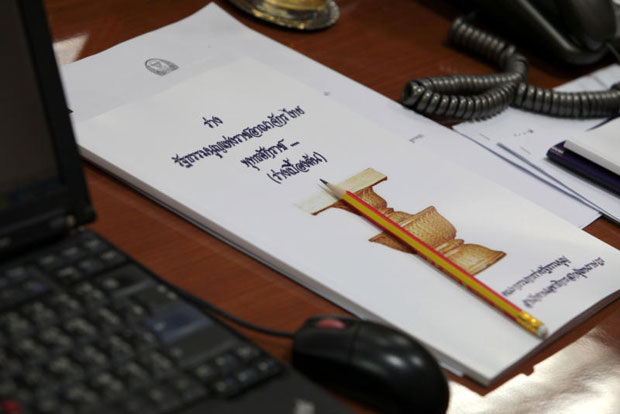
The National Council for Peace and Order has been attacked from a new quarter with the network of academics for people's rights rejecting the draft constitution on the grounds that it curtails liberties.
The draft charter, written by the Constitution Drafting Committee chaired by Meechai Ruchupan, is scheduled to go to a public referendum on Aug 7.
The network is led by Anusorn Unno, dean of the Faculty of Sociology and Anthropology of Thammasat University, Wichit Likijkhitsomboon, a lecturer in the Faculty of Economics of Thammasat University, and Puangthong Pawakrapan, a lecturer in the Faculty of Political Science of Chulalongkorn University.
The statement read by Mr Anusorn said a constitution is a form of "social contract" agreed on by all sectors in society as a rule for political and social activities and co-existence, but the draft constitution of the NCPO was for the benefit of a certain group of people only.
The NCPO's draft charter had no respect for the people, the statement said. Many provisions in the draft were likely to weaken the parliamentary system. They included the ones which allow for an unelected "outsider" to be prime minster; for the senate to have 250 members appointed by the NCPO, six of them ex-officio members from security-related permanent officials; for the implementation of a new method of electing party-list MPs through calculation; and, for the NCPO to remain in power for one year after the charter referendum.
The statement said the draft destroyed the rule of law regarding power separation. Judicial and independent organisations would have power over the parliament and government, but there were no mechanisms to control those organisations.
The draft charter also infringed on the sovereign power of the people because it gave the power to decide security-related matters to the armed forces and a group of people outside the state administration.
Moreover, the draft charter was written in a way that made amendments difficult or impossible, said the statement.
A source said the academics planned to ask the NCPO to return power to the people by calling an election as soon as possible if the draft charter failed to pass the referendum, and allow the parliament and government after the election to draft a new constitution and carry out reforms based on full-fledged democracy.

